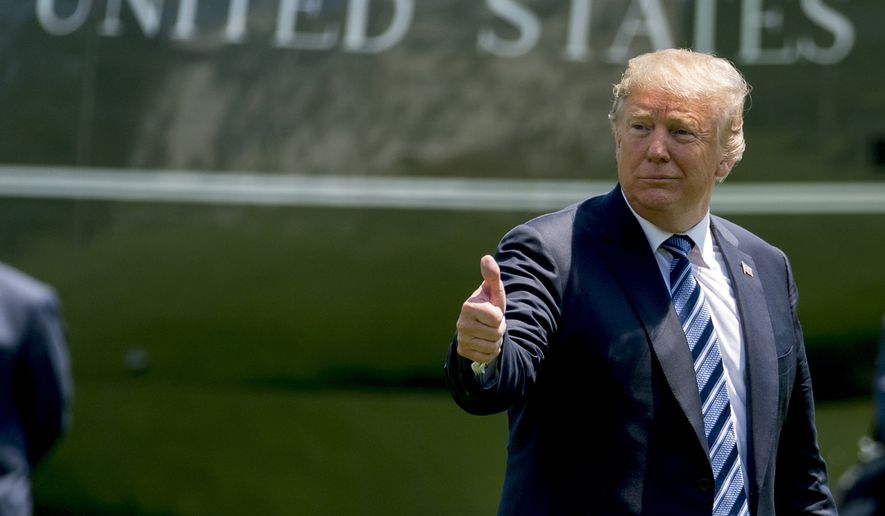By S.A. Miller - The Washington Times - Friday, May 25, 2018
President Trump has ordered a crackdown on poor performance and misbehavior within the ranks of the federal workforce, senior administration officials said Friday.
Mr. Trump signed a trio of executive orders that reform civil service rules by expediting termination for cause, revamping union contracts and limiting taxpayer-funded union work at agencies, said a senior administration official.
“Today the president is fulfilling his promise to promote more efficient government by reforming civil service rules,” said Andrew P. Bremberg, director of the White House Domestic Policy Council.
He said the president was instituting “merit system principles.”
“These executive orders will make it easier for agencies to remove poor-performing employees and make sure taxpayer dollars are more efficiently used,” Mr. Bremberg said.
The move will promote efficiency, save taxpayer dollars and create better work environments for “thousands of employees who come to work each day and do a great job,” said another official.
The changes met loud objections from unions.
“This is more than union busting – it’s democracy busting,” said AFGE National President J. David Cox Sr. “These executive orders are a direct assault on the legal rights and protections that Congress has specifically guaranteed to the 2 million public-sector employees across the country who work for the federal government.”
Complaints about deadwood in federal agencies are nothing new. And the administration offered statistics to highlight the need for reforms:
• Office of Personnel Management data shows federal employees are 44 times less likely to be fired than a private sector worker once they’ve completed a probationary period.
• A recent Government Accountability Office report showed that it takes between six months and a year to remove a federal employee for poor performance, followed by an eight-month appeals process.
Sen. Ron Johnson, chairman of the Senate Homeland Security and Governmental Affairs Committee, applauded the orders.
“Today’s executive orders are an important step to help ensure government is primarily directed toward benefiting the American people — not government employees,” he said.
Sen. James Lankford, Oklahoma Republican and chairman of the subcommittee on Regulatory Affairs and Federal Management, said it would make the federal workforce stronger.
“We have thousands of federal employees who work very hard for the nation; it’s important that their work is not frustrated by the poor performance of a small few,” he said.
The executive orders also target taxpayer-funded union activity at federal agencies, including ending taxpayer-funded lobbying by unions.
Rick Manning, president of Americans for Limited Government, said the reforms were long overdue.
“There is nothing more galling to limited government advocates than public employee unions being largely subsidized by taxpayer dollars while using their dues payments to support politicians in favor of expanding government,” said Mr. Manning.
“There is nothing more galling to limited government advocates than public employee unions being largely subsidized by taxpayer dollars while using their dues payments to support politicians in favor of expanding government,” said Mr. Manning.
The order directs agencies to work on renegotiating contracts to cut taxpayer-funded union time by an average of two-thirds, reducing union business interfering with agency operations.
The Social Security Administration estimates it could complete 135,000 more retirement applications or 17,000 more disability determinations annually if taxpayer funding for union activities were redirected to public service functions.
Under one of the orders, federal employees authorized to act on behalf of unions will be permitted to spend no more than 25 percent of their time on union business.
The administration noted that over 470 Veterans Affairs employees spend 100 percent of their duty hours working for a labor union instead of serving veterans. Those employees include 74 full-time nurses.
The order cuts back on lobbying or pursuing a grievance against an agency on taxpayer-funded union time.
It also authorizes agencies to charge rent to employees that use Federal office space for non-agency business and to stop paying travel expenses for non-agency business.
The administration estimated that these cutbacks on taxpayer-funded union activity, when fully implemented, would save at least $100 million a year.
Another of executive order directs agencies to negotiate better contracts with Federal unions to reduce costs and promote accountability.
It will eliminate years of drawn-out bargaining with unions by encouraging agencies to conclude labor negotiations in less than a year.
The administration noted that agencies pay union negotiators’ salaries, so taxpayers foot the bill when bargaining drags on for years.
The salaries for union negotiators cost $16 million in 2016 alone, according to the administration.





No comments:
Post a Comment